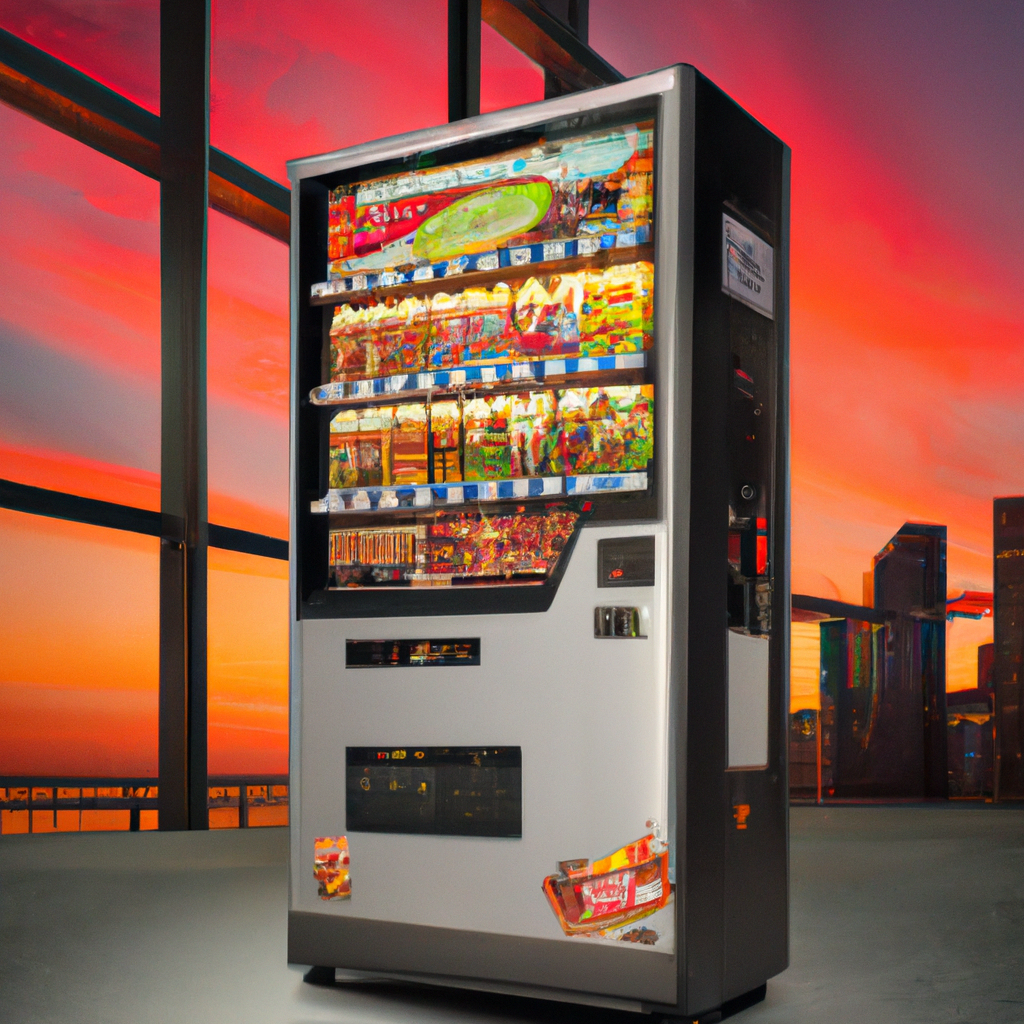
Are you tired of working long hours and not seeing the financial rewards you desire? Look no further! In this ultimate guide, we will show you how to make passive income with a vending machine business. Imagine having money pouring into your pockets while you relax on the beach or spend quality time with loved ones. With our expert tips and strategies, you will learn how to set up a profitable vending machine business that works for you 24/7. Say goodbye to the traditional 9-to-5 grind and hello to a life of financial freedom. Get ready to unlock the secrets of passive income and embark on a journey to financial success!

Finding the Right Vending Machine
Researching the Market
Before starting a vending machine business, it is important to research the market thoroughly. By understanding the current trends and demands, you can make informed decisions about the types of products you want to sell and where to set up your vending machines. Look for popular products that have a high demand and consider the preferences of your target audience.
Choosing the Best Type of Vending Machine
Once you have researched the market, it’s time to choose the best type of vending machine for your business. There are many different types available, including snack machines, beverage machines, and combination machines. Consider the products you want to sell and the space available for the vending machine. Additionally, think about any special features you may need, such as temperature control for perishable items.
Considerations for Location
Finding the right location for your vending machine is crucial for maximizing your profit potential. Look for high-traffic areas such as office buildings, schools, and shopping centers. Consider the demographics of the area and the type of products that would appeal to the people who frequent that location. Make sure to obtain permission from the property owner before installing your vending machine.
Determining the Ideal Investment
Before starting your vending machine business, it is important to determine the ideal investment for your budget and goals. Consider the costs associated with purchasing or leasing the vending machines, obtaining necessary licenses and permits, stocking inventory, and marketing your business. Take into account your projected income and expenses to ensure that your investment will be profitable in the long run.
Securing Funding
Assessing Your Financial Situation
To secure funding for your vending machine business, it is important to assess your financial situation. Calculate your current assets, liabilities, and cash flow to determine how much capital you have available. This will help you understand how much funding you will need and what options are available to you.
Exploring Financing Options
There are several financing options available for starting a vending machine business. You can consider traditional business loans from banks, credit unions, or other financial institutions. Additionally, there are specific vending machine financing programs offered by some companies. Explore all your options and choose the one that best fits your needs and financial situation.
Creating a Budget Plan
Once you have secured funding, it is crucial to create a budget plan for your vending machine business. This will help you keep track of your income and expenses, and ensure that you are staying within your financial limits. Consider all the costs associated with running your business, such as machine maintenance, inventory restocking, marketing, and any fees or taxes.
Estimating Return on Investment
Estimating the return on investment (ROI) is important to assess the profitability of your vending machine business. Take into account the initial investment, ongoing expenses, and projected income. Keep in mind factors such as location, product demand, competition, and any seasonal fluctuations. By estimating the ROI, you can make informed decisions about your business strategy and adjust as needed.
Setting Up Your Vending Machine Business
Obtaining Licenses and Permits
Before setting up your vending machine business, it is crucial to obtain the necessary licenses and permits. These requirements vary depending on your location and the type of products you plan to sell. Research the local regulations and consult with the appropriate authorities or legal professionals to ensure that your business is compliant.
Finding Suitable Locations
Finding suitable locations for your vending machines is essential for maximizing sales. Look for areas with high foot traffic and where your target audience is likely to visit. Consider places such as office buildings, universities, hospitals, and recreational areas. Establish relationships with property owners or managers to secure the best locations.
Negotiating Contracts with Property Owners
When setting up your vending machines, it is important to negotiate contracts with property owners or managers. Discuss the terms and conditions, including rent, maintenance responsibilities, and any revenue-sharing agreements. Ensure that both parties are clear on their obligations and that the contract protects your interests as well.
Installing and Stocking the Vending Machine
After securing the location and finalizing contracts, it’s time to install and stock your vending machines. Hire professionals or follow manufacturer instructions to ensure proper installation and maintenance of the machines. Stock them with a variety of products that cater to your target audience’s preferences, ensuring that you monitor and adjust inventory levels accordingly.
Managing Inventory and Supplies
Sourcing Products
To manage inventory effectively, it is important to source products from reliable suppliers. Look for wholesale options that offer competitive prices and a wide range of products. Consider factors such as product quality, shelf life, and popularity among your target audience. Maintain good relationships with suppliers to ensure timely restocking and access to new products.
Analyzing Sales Data
Analyzing sales data is crucial for identifying trends, understanding customer preferences, and optimizing your inventory. Monitor sales figures, product popularity, and peak times to make data-driven decisions about inventory management. Consider implementing vending machine software or using sales tracking tools to streamline this process and gain valuable insights.
Monitoring Inventory Levels
Regularly monitoring and maintaining optimal inventory levels is essential for a successful vending machine business. Keep track of product quantities and restock popular items as needed. Avoid overstocking slow-selling products to prevent waste and maximize profitability. Consider implementing automated inventory management systems to simplify this process.
Maintaining Stock Freshness
To ensure customer satisfaction and repeat business, it is important to maintain the freshness of your products. Regularly check expiration dates and rotate stock to prevent selling expired items. Keep an eye on temperature control for perishable items, such as beverages or refrigerated snacks. Prioritize quality and freshness to build trust with your customers.

Pricing and Profitability
Determining Competitive Pricing
Determining competitive pricing is crucial for attracting customers while ensuring profitability. Research the market and analyze the pricing strategies of your competitors. Consider factors such as product quality, location, and customer demand when setting prices for your vending machine products. Regularly evaluate and adjust pricing to stay competitive and maximize profit margins.
Calculating Operating Costs
Calculating your operating costs accurately is essential for understanding your profitability. Consider all the expenses associated with running your vending machine business, including machine maintenance, product restocking, licensing fees, utilities, and marketing. By accurately tracking these costs, you can make informed decisions about pricing and ensure your business remains profitable.
Maximizing Profit Margins
Maximizing profit margins is a key goal for any business owner. Look for ways to reduce costs without compromising product quality or customer satisfaction. Negotiate better deals with suppliers, optimize inventory management, and explore cost-saving measures such as energy-efficient machines or bulk purchasing. Regularly review your financials to identify areas where you can improve profit margins.
Implementing Pricing Strategies
Implementing effective pricing strategies can drive sales and increase profitability. Consider strategies such as offering bundle deals, discounts for bulk purchases, or limited-time promotions. Experiment with different pricing approaches to gauge customer response and adjust accordingly. Constantly monitor market trends and customer feedback to stay competitive in the industry.
Maintenance and Repairs
Regular Cleaning and Maintenance
Regular cleaning and maintenance are essential for the smooth operation of your vending machines. Develop a schedule to clean and sanitize them regularly. Pay attention to key areas such as coin slots, product dispensing mechanisms, and screens. Regular maintenance checks should include inspecting and repairing any damaged parts, ensuring proper functioning, and resolving any minor issues promptly.
Troubleshooting Common Issues
Despite regular maintenance, vending machines may encounter common issues that need troubleshooting. Train yourself or your staff to handle common problems such as coin jams, product jams, or machine errors. Create a troubleshooting guide to reference when issues arise, and maintain a supply of common replacement parts to resolve issues quickly.
Proactive Repairs and Upgrades
Taking a proactive approach to repairs and upgrades can prevent major breakdowns and improve the overall efficiency of your vending machines. Regularly assess the condition of your machines and schedule proactive repairs or upgrades as needed. Stay up to date with industry advancements and technology to ensure your vending machines remain competitive and efficient.
Partnering with Service Providers
Partnering with reliable service providers can simplify the process of maintenance and repairs. Research and establish relationships with local vending machine repair companies or service providers. They can provide professional expertise and handle complex repairs or upgrades. Regularly communicate with your service providers to ensure a prompt response and minimize machine downtime.

Marketing and Promotions
Creating Eye-Catching Displays
Creating eye-catching displays is essential for attracting customers to your vending machines. Use visually appealing signage, banners, or digital displays to showcase your products and draw attention. Consider the placement and arrangement of products to make them easily accessible and visually appealing. Utilize color schemes and graphics that align with your brand and target audience.
Implementing Strategic Product Placement
Strategic product placement can improve sales and customer satisfaction. Organize products in a logical and appealing manner, making it easy for customers to find what they are looking for. Place popular or high-margin items at eye level or in prominent spots. Experiment with different product configurations to optimize sales and identify the most effective placement strategies.
Offering Special Deals and Discounts
Offering special deals and discounts can entice customers to choose your vending machine over the competition. Implement promotions such as buy-one-get-one-free, happy hour discounts, or loyalty rewards programs. Use signage or digital displays to highlight these offers and create a sense of urgency. Regularly evaluate the effectiveness of different promotions and adjust them as needed.
Utilizing Social Media and Digital Marketing
In today’s digital age, utilizing social media and digital marketing can significantly boost your vending machine business. Create social media accounts and engage with your target audience by sharing updates, promotions, and customer testimonials. Consider running targeted online ads or partnering with influencers to increase brand awareness and drive traffic to your vending machines.
Customer Service and Satisfaction
Providing Excellent Customer Support
Providing excellent customer support is key to building customer loyalty and satisfaction. Train your staff to be knowledgeable, attentive, and friendly when interacting with customers. Promptly address any concerns, questions, or issues that customers may have. Enhance the overall customer experience by providing clear and accessible contact information for support inquiries.
Addressing Complaints and Feedback
Addressing complaints and feedback is crucial for maintaining a positive reputation and improving your business. Actively listen to customer complaints, and take them seriously. Resolve issues promptly and professionally, and use feedback to make necessary improvements. Implement a system to easily collect and analyze customer feedback, ensuring continuous improvement in your business operations.
Implementing Cashless Payment Options
In today’s digital world, implementing cashless payment options can enhance the convenience and satisfaction of your customers. Consider accepting mobile payments, credit cards, or contactless payment methods. Partner with reputable payment processing companies to ensure secure transactions and seamless integration with your vending machines.
Building Customer Loyalty Programs
Building customer loyalty programs can encourage repeat business and create a loyal customer base. Implement programs such as frequent buyer rewards, points-based systems, or exclusive discounts for regular customers. Promote these programs through signage, social media, and digital marketing to attract and retain loyal customers. Regularly evaluate the effectiveness of these programs and make adjustments based on customer feedback.

Scaling and Expanding Your Business
Assessing Market Demand
Assessing market demand is crucial before scaling or expanding your vending machine business. Research new locations and analyze potential markets to gauge the demand for your products. Consider factors such as population density, demographics, and competition. Conduct market surveys or consult with market research professionals to ensure that expansion will be financially viable.
Adding More Vending Machines
Adding more vending machines is a common way to scale your business and increase your passive income. Evaluate your existing locations and identify opportunities for additional machines. Consider expanding to new locations or establishing partnerships with other businesses to place your vending machines in their premises. Gradually add machines while carefully monitoring their profitability.
Diversifying Product Offerings
Diversifying your product offerings can attract a wider customer base and increase sales. Conduct market research to identify new trends or products that align with your target audience’s preferences. Consider adding healthier snack options, trend-based products, or specialty items. Evaluate the potential demand and profitability of new products before adding them to your vending machines.
Exploring New Locations
Exploring new locations is an effective way to expand your vending machine business. Look for areas with untapped potential or high foot traffic that are not already saturated with vending machines. Consider partnering with property owners or businesses to secure prime locations. Conduct thorough market research and carefully assess the feasibility and profitability of each new location.
Legal and Tax Considerations
Understanding Business Laws and Regulations
Understanding business laws and regulations is crucial for operating your vending machine business legally and responsibly. Research the laws and regulations specific to vending machines in your area, including licensing requirements, health and safety regulations, and product labeling guidelines. Consult with legal professionals if needed to ensure full compliance with all applicable laws.
Keeping Track of Financial Records
Keeping track of accurate financial records is essential for tax reporting and overall business management. Implement a system to record all income and expenses related to your vending machine business. Maintain organized records of invoices, receipts, and financial statements. Consider using accounting software or hiring a professional accountant to ensure proper record-keeping.
Consulting with a Tax Professional
Consulting with a tax professional is highly recommended to navigate the complexities of tax obligations for your vending machine business. They can provide guidance on applicable taxes, deductions, and other tax-related considerations. They will help you comply with tax laws and maximize your tax savings while minimizing the risk of audits or penalties.
Preparing for Audits
Being prepared for audits is crucial to ensure a smooth and stress-free process. Keep all financial records organized and readily accessible. Regularly review and reconcile your records to identify any discrepancies or issues. By having accurate and well-maintained financial records, you can confidently face any audits or inspections that may arise.
In conclusion, starting a vending machine business can be a lucrative venture for generating passive income. By following the steps outlined in this comprehensive article, you can confidently navigate the process of finding the right vending machine, securing funding, setting up your business, managing inventory, promoting your business, and complying with legal and tax obligations. Remember to adapt and adjust your strategies as needed to maximize profitability, customer satisfaction, and long-term success in the vending machine industry.



